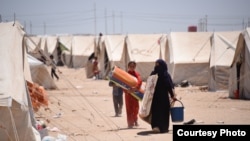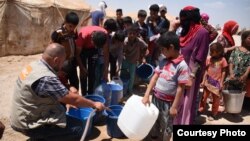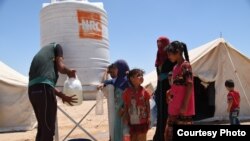Hundreds of families were pouring out of the Fallujah war zone Thursday after Islamic State militants apparently lost control of the main road southwest of the city.
Thousands of people crossed the bridge out of the city and walked 15 kilometers to reach the al-Salam junction, where they are collected by Iraqi security forces and local authorities.
The flood of people, most of whom had been without adequate food, clean water or medical care for months, will arrive at camps that are already bursting at the seams.
“At the moment we are meeting the minimum requirements. Everyone is getting sufficient water, shelter — just,” Peter Hawkins, UNICEF’s Iraq representative told VOA. “Trying to stay ahead of the game is a constant challenge.”
Some 42,000 people have fled Fallujah since Iraqi security forces, backed by coalition airstrikes and an army of Shi’ite militias, launched an offensive to retake the city from Islamic State control.
Barely holding on
For weeks, families, many with small children, have been fleeing under sniper fire and punishing heat to arrive at camps set up outside the city. New camps are now being built by both the government of Iraq and U.N. agencies to shelter the new arrivals.
“Sometimes people are occupying camps even before they are completed, and all the facilities for humanitarian standards have not been met,” acknowledged UNHCR’s Bruno Geddo.
In some instances, one tent is being occupied by more than one family.
Agencies are rushing in portable toilets, water, medical services, hygiene kits, and basic household goods.
“We are holding on, but unless there are significant resources received from the international community across the board, it will become more difficult to hold on,” Hawkins warned.
Some humanitarian groups are already struggling to meet the refugees’ needs.
Not enough water
The Norwegian Refugee Council (NRC) has been supplying desperately needed potable water, but is now only able to provide 3 liters of drinking water per person per day, which it says is below the minimum humanitarian standard.
“We have a humanitarian disaster inside Fallujah and another unfolding disaster in the camps,” said NRC’s secretary-general, Jan Egeland.
“We are running out of food, water and medical services,” Egeland said in a statement.
The NRC warned that with rising summer temperatures and inadequate potable water, people could start drinking unsafe water, leading to serious public health problems.
Organizations are already preparing for a possible cholera outbreak. Although cholera is endemic in parts of Iraq, it is much more likely to break out when there are large populations crammed together with limited water supplies.
The World Health Organization is similarly concerned.
“The low level of immunity coupled with poor hygiene conditions raises the risk of disease outbreaks, such as measles,” WHO regional director for the eastern Mediterranean, Ala Alwan said in a statement Thursday.
Fabio Forgione of Medecins Sans Frontieres (Doctors Without Borders) agreed.
“We do share the same concerns. Even the water and sanitation conditions seem to be very poor in the camps and definitely not adequate,” he told VOA in a telephone interview from Baghdad.
No coordination
Adding to the stress, there does not appear to be any clear central entity coordinating all the different organizations now working in the area, Forgione said.
“We see several organizations sometimes duplicating activities,” he said.
As the Iraqi military operations advance in Fallujah, and thousands more flee the fighting, that situation could worsen.
And Fallujah is just the latest displacement crisis. According to the International Organization of Migration, there are now 3.3 million displaced in Iraq, pushed out of their homes by constant waves of violence.
So far, U.N. humanitarian agencies say they have received just over 30 percent of the funding necessary to meet the needs of those affected by the conflict.
“As long as the Iraqi appeal is underfunded, there will always be the risk of gaps in our response, and until the appeal is fully funded we will always struggle to maintain the level of services for refugees, displaced and those continually affected by the situation in Iraq,” Hawkins said.







